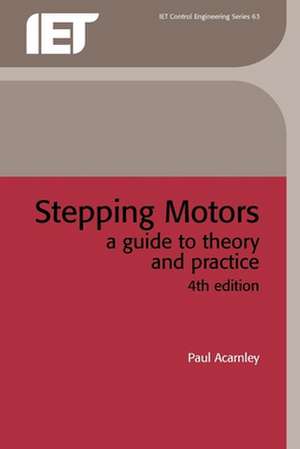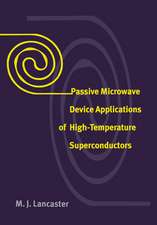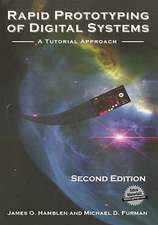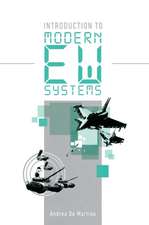Stepping Motors: A Guide to Theory and Practice: Control, Robotics and Sensors
Autor Paul Acarnleyen Limba Engleză Paperback – apr 2002
Din seria Control, Robotics and Sensors
- 18%
 Preț: 733.22 lei
Preț: 733.22 lei - 18%
 Preț: 1032.68 lei
Preț: 1032.68 lei - 18%
 Preț: 876.08 lei
Preț: 876.08 lei - 18%
 Preț: 929.38 lei
Preț: 929.38 lei - 18%
 Preț: 776.21 lei
Preț: 776.21 lei - 18%
 Preț: 1033.59 lei
Preț: 1033.59 lei - 20%
 Preț: 800.64 lei
Preț: 800.64 lei - 18%
 Preț: 784.33 lei
Preț: 784.33 lei - 18%
 Preț: 781.62 lei
Preț: 781.62 lei - 18%
 Preț: 821.04 lei
Preț: 821.04 lei - 18%
 Preț: 819.22 lei
Preț: 819.22 lei - 18%
 Preț: 1029.98 lei
Preț: 1029.98 lei - 5%
 Preț: 1069.62 lei
Preț: 1069.62 lei - 18%
 Preț: 749.31 lei
Preț: 749.31 lei - 15%
 Preț: 490.50 lei
Preț: 490.50 lei - 18%
 Preț: 880.26 lei
Preț: 880.26 lei - 18%
 Preț: 885.66 lei
Preț: 885.66 lei - 18%
 Preț: 779.84 lei
Preț: 779.84 lei - 20%
 Preț: 922.55 lei
Preț: 922.55 lei - 18%
 Preț: 781.62 lei
Preț: 781.62 lei - 18%
 Preț: 807.65 lei
Preț: 807.65 lei - 18%
 Preț: 779.52 lei
Preț: 779.52 lei - 18%
 Preț: 983.52 lei
Preț: 983.52 lei - 18%
 Preț: 757.42 lei
Preț: 757.42 lei - 18%
 Preț: 804.95 lei
Preț: 804.95 lei - 20%
 Preț: 781.16 lei
Preț: 781.16 lei - 18%
 Preț: 891.06 lei
Preț: 891.06 lei - 20%
 Preț: 779.30 lei
Preț: 779.30 lei - 18%
 Preț: 781.62 lei
Preț: 781.62 lei - 18%
 Preț: 918.90 lei
Preț: 918.90 lei - 18%
 Preț: 996.12 lei
Preț: 996.12 lei - 20%
 Preț: 819.62 lei
Preț: 819.62 lei - 18%
 Preț: 768.42 lei
Preț: 768.42 lei -
 Preț: 426.41 lei
Preț: 426.41 lei - 18%
 Preț: 807.65 lei
Preț: 807.65 lei - 18%
 Preț: 781.62 lei
Preț: 781.62 lei - 18%
 Preț: 728.01 lei
Preț: 728.01 lei
Preț: 467.25 lei
Preț vechi: 549.71 lei
-15% Nou
Puncte Express: 701
Preț estimativ în valută:
89.43€ • 96.53$ • 74.99£
89.43€ • 96.53$ • 74.99£
Carte disponibilă
Livrare economică 29 martie-12 aprilie
Preluare comenzi: 021 569.72.76
Specificații
ISBN-13: 9780852964170
ISBN-10: 085296417X
Pagini: 172
Dimensiuni: 156 x 234 x 9 mm
Greutate: 0.27 kg
Ediția:4 ed
Editura: Institution of Engineering and Technology
Colecția Control, Robotics and Sensors
Seria Control, Robotics and Sensors
ISBN-10: 085296417X
Pagini: 172
Dimensiuni: 156 x 234 x 9 mm
Greutate: 0.27 kg
Ediția:4 ed
Editura: Institution of Engineering and Technology
Colecția Control, Robotics and Sensors
Seria Control, Robotics and Sensors
Descriere
This book provides an introductory text which will enable the reader to both appreciate the essential characteristics of stepping motor systems and understand how these characteristics are being exploited in the continuing development of new motors, drives and controllers.




























